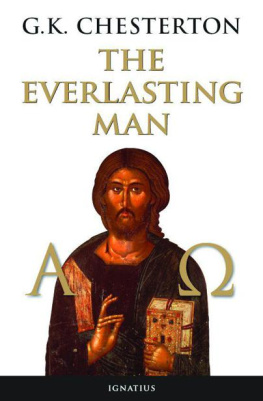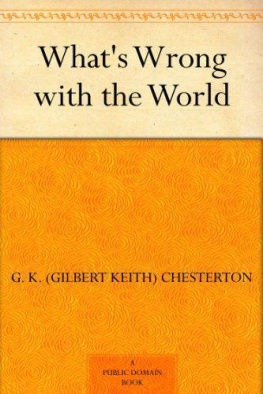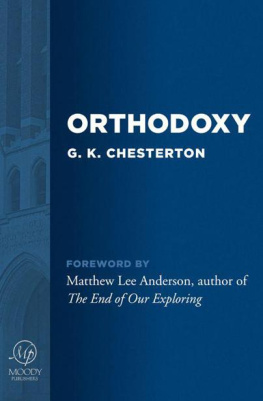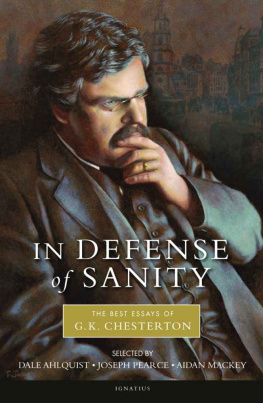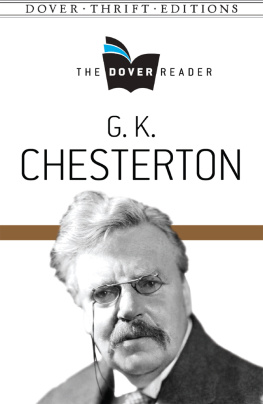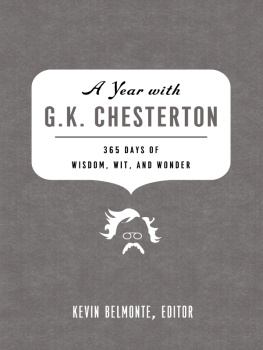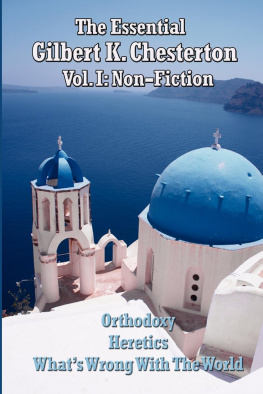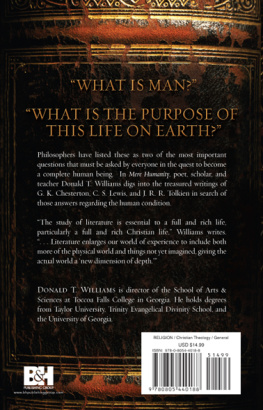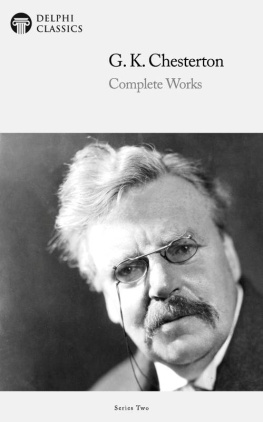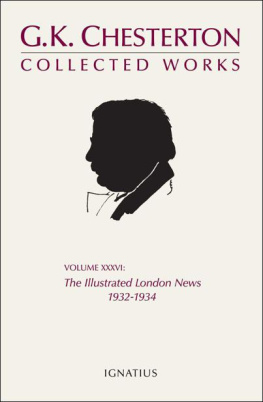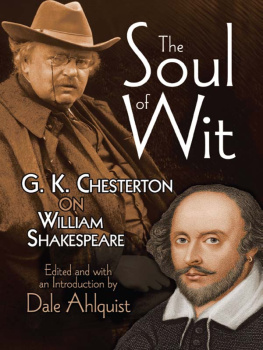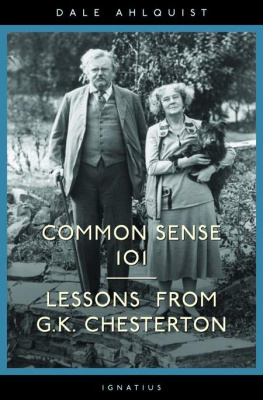G. K. CHESTERTON
THE EVERLASTING MAN
G. K. CHESTERTON
THE
EVERLASTING
MAN
IGNATIUS PRESS SAN FRANCISCO
Original edition published in 1925
Reprinted with permission of
The Royal Literary Fund and A. P. Watt Ltd.
All rights reserved
Cover art:
Christ as Redeemer and Source of Life (1393-4)
Metropolitos, John (14 century A.D.)
Gallery of Art, Skopje, Macedonia
Bridgeman-Giraudon / Art Resource, New York
Cover design by Roxanne Mei Lum
Reprinted in 1993, 2008 by Ignatius Press, San Francisco
All rights reserved
ISBN 978-0-89870-444-0
Library of Congress Control Number 92-75662
CONTENTS
I
II
III
IV
V
VI
VII
VIII
I
II
III
IV
V
VI
PREFATORY NOTE
This book needs a preliminary note that its scope be not misunderstood. The view suggested is historical rather than theological, and does not deal directly with a religious change which has been the chief event of my own life; and about which I am already writing a more purely controversial volume. It is impossible, I hope, for any Catholic to write any book on any subject, above all this subject, without showing that he is a Catholic; but this study is not specially concerned with the differences between a Catholic and a Protestant. Much of it is devoted to many sorts of Pagans rather than any sort of Christians; and its thesis is that those who say that Christ stands side by side with similar myths, and his religion side by side with similar religions, are only repeating a very stale formula contradicted by a very striking fact. To suggest this I have not needed to go much beyond matters known to us all; I make no claim to learning; and have to depend for some things, as has rather become the fashion, on those who are more learned. As I have more than once differed from Mr. H. G. Wells in his view of history, it is the more right that I should here congratulate him on the courage and constructive imagination which carried through his vast and varied and intensely interesting work; but still more on having asserted the reasonable right of the amateur to do what he can with the facts which the specialists provide.
INTRODUCTION
THE PLAN OF THIS BOOK
There are two ways of getting home; and one of them is to stay there. The other is to walk round the whole world till we come back to the same place; and I tried to trace such a journey in a story I once wrote. It is, however, a relief to turn from that topic to another story that I never wrote. Like every book I never wrote, it is by far the best book I have ever written. It is only too probable that I shall never write it, so I will use it symbolically here; for it was a symbol of the same truth. I conceived it as a romance of those vast valleys with sloping sides, like those along which the ancient White Horses of Wessex are scrawled along the flanks of the hills. It concerned some boy whose farm or cottage stood on such a slope, and who went on his travels to find something, such as the effigy and grave of some giant; and when he was far enough from home he looked back and saw that his own farm and kitchen-garden, shining flat on the hill-side like the colours and quarterings of a shield, were but parts of some such gigantic figure, on which he had always lived, but which was too large and too close to be seen. That, I think, is a true picture of the progress of any really independent intelligence to-day; and that is the point of this book.
The point of this book, in other words, is that the next best thing to being really inside Christendom is to be really outside it. And a particular point of it is that the popular critics of Christianity are not really outside it. They are on a debatable ground, in every sense of the term. They are doubtful in their very doubts. Their criticism has taken on a curious tone; as of a random and illiterate heckling. Thus they make current and anti-clerical cant as a sort of small-talk. They will complain of parsons dressing like parsons; as if we should be any more free if all the police who shadowed or collared us were plainclothes detectives. Or they will complain that a sermon cannot be interrupted, and call a pulpit a cowards castle; though they do not call an; editors office a cowards castle. It would be unjust both to journalists and priests; but it would be much truer of journalists. The clergyman appears in person and could easily be kicked as he came out of church; the journalist conceals even his name so that nobody can kick him. They write wild and pointless articles and letters in the press about why the churches are empty, without even going there to find out if they are empty, or which of them are empty. Their suggestions are more vapid and vacant than the most insipid curate in a three-act farce, and move us to comfort him after the manner of the curate in the Bab Ballads; Your mind is not so blank as that of Hopley Porter. So we may truly say to the very feeblest cleric: Your mind is not so blank as that of Indignant Layman or Plain Man or Man in the Street, or any of your critics in the newspapers; for they have not the most shadowy notion of what they want themselves, let alone of what you ought to give them. They will suddenly turn round and revile the Church for not having prevented the War, which they themselves did not want to prevent; and which nobody had ever professed to be able to prevent, except some of that very school of progressive and cosmopolitan sceptics who are the chief enemies of the Church. It was the anti-clerical and agnostic world that was always prophesying the advent of universal peace; it is that world that was, or should have been, abashed and confounded by the advent of universal war. As for the general view that the Church was discredited by the Warthey might as well say that the Ark was discredited by the Flood. When the world goes wrong, it proves rather that the Church is right. The Church is justified, not because her children do not sin, but because they do. But that marks their mood about the whole religious tradition: they are in a state of reaction against it. It is well with the boy when he lives on his fathers land; and well with him again when he is far enough from it to look back on it and see it as a whole. But these people have got into an intermediate state, have fallen into an intervening valley from which they can see neither the heights beyond them nor the heights behind. They cannot get out of the penumbra of Christian controversy. They cannot be Christians and they cannot leave off being Anti-Christians. Their whole atmosphere is the atmosphere of a reaction: sulks, perversity, petty criticism. They still live in the shadow of the faith and have lost the light of the faith.
Now the best relation to our spiritual home is to be near enough to love it. But the next best is to be far enough away not to hate it. It is the contention of these pages that while the best judge of Christianity is a Christian, the next best judge would be something more like a Confucian. The worst judge of all is the man now most ready with his judgments; the ill-educated Christian turning gradually into the ill-tempered agnostic, entangled in the end of a feud of which he never understood the beginning, blighted with a sort of hereditary boredom with he knows not what, and already weary of hearing what he has never heard. He does not judge Christianity calmly as a Confucian would; he does not judge it as he would judge Confucianism. He cannot by an effort of fancy set the Catholic Church thousands of miles away in strange skies of morning and judge it as impartially as a Chinese pagoda. It is said that the great St. Francis Xavier, who very nearly succeeded in setting up the Church there as a tower overtopping all pagodas, failed partly because his followers were accused by their fellow missionaries of representing the Twelve Apostles with the garb or attributes of Chinamen. But it would be far better to see them as Chinamen, and judge them fairly as Chinamen, than to see them as featureless idols merely made to be battered by iconoclasts; or rather as cockshies to be pelted by empty-handed cockneys. It would be better to see the whole thing as a remote Asiatic cult; the mitres of its bishops as the towering headdresses of mysterious bonzes; its pastoral staffs as the sticks twisted like serpents carried in some Asiatic procession; to see the prayer-book as fantastic as the prayer-wheel and the Cross as crooked as the Swastika. Then at least we should not lose our temper as some of the Sceptical critics seem to lose their temper, not to mention their wits. Their anti-clericalism has become an atmosphere, an atmosphere of negation and hostility from which they cannot escape. Compared with that, it would be better to see the whole thing as something belonging to another continent, or to another planet. It would be more philosophical to stare indifferently at bonzes than to be perpetually and pointlessly grumbling at bishops. It would be better to walk past a church as if it were a pagoda than to stand permanently in the porch, impotent either to go inside and help or to go outside and forget. For those in whom a mere reaction has thus become an obsession, I do seriously recommend the imaginative effort of conceiving the Twelve Apostles as Chinamen. In other words, I recommend these critics to try to do as much justice to Christian saints as if they were Pagan sages.
Next page
